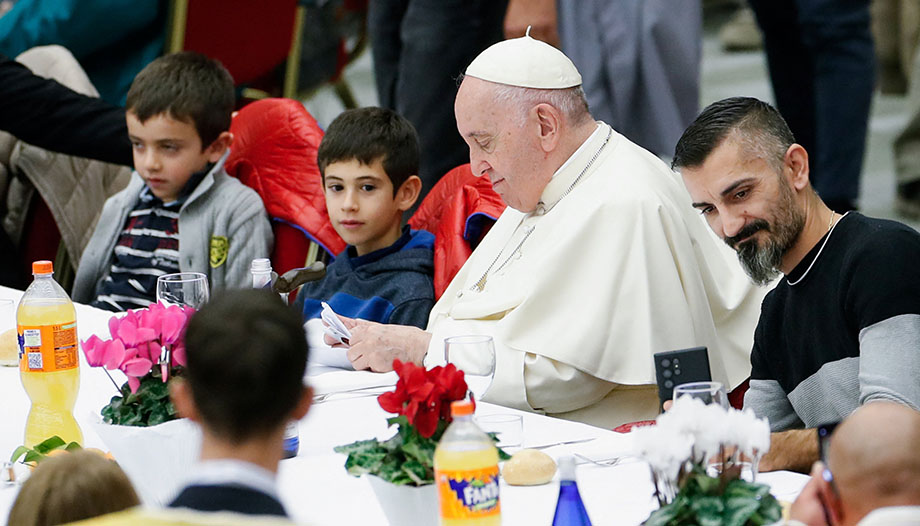The poor are not a number, but a face to be approached, welcomed, supported economically and politically.
The exhortation not to look away from those who suffer: children in war zones, those who struggle to make ends meet, workers forced to suffer inhumane treatment with inadequate pay or the burden of precariousness.
The gaze of a poor person changes the course of the life of the one who meets him, but you have to have the courage to stand in those eyes and then act by helping for what the other needs.
This is the heart of the Message of Pope Francis for the VII World Day of the PoorThe event is scheduled for November 19.
In the text on the theme "Do not turn your eyes away from the poor", reference is made to the Book of Tobit and to an interpretation of reality that starts from recognizing in the most fragile "the face of the Lord Jesus", beyond the color of the skin, social status and origin. In him there is a brother to reach out to, "shaking off from us the indifference and the obviousness with which we shield an illusory well-being".
The reality in which we live, the Pope stresses, is marked by the excessive volume of the call to opulence and, therefore, by the silencing of the voices of the poor. "There is a tendency to overlook everything that does not fit into the models of life intended above all for the younger generations, who are the most fragile in the face of the cultural change that is taking place." What causes suffering is put in parentheses, the physical is exalted as a goal to be achieved, virtual reality is confused with real life.
"The poor," writes the Bishop of Rome, "become images that can move us for a few moments, but when we meet them in flesh and blood on the street, then annoyance and marginalization take hold of us." However, "personal involvement is the vocation of every Christian".
There is still much work to be done to ensure a decent life for many, so that the Pacem in Terris of John XXIIIwritten 60 years ago, should become a reality, "also through a serious and effective political and legislative commitment".
Taking advantage of the "solidarity and subsidiarity of so many citizens who believe in the value of the voluntary commitment of dedication to the poor" in the face of the failures of politics in the service of the common good.
The Holy Father turns his gaze to the new poor. To the children who live a difficult present and see their future compromised because of war. No one," he writes, "will ever be able to get used to this situation; let us keep alive every attempt so that peace may be affirmed as a gift of the Risen Lord and the fruit of commitment to justice and dialogue".
The Pope's closeness also extends to those who, faced with the "dramatic increase in costs" are forced to choose between food or medicine, hence the invitation to raise their voices to guarantee the right to both goods, "in the name of the dignity of the human person".
Expressing his concern for young people - "how many frustrated lives and even suicides of young people, deceived by a culture that leads them to feel 'unfinished' and 'failures' - Francis asks for help "so that each one may find the path to follow to acquire a strong and generous identity".
Hence, "gratitude to so many volunteers - people capable of listening, dialoguing and counseling - calls for prayer so that their witness may be fruitful".
In conclusion, quoting St. Therese of the Child Jesus 150 years after her birth, Francis recalled that "everyone has the right to be enlightened by the charity that gives meaning to the whole Christian life".
Interviewed by vaticanews.va Rino Fisichella, pro-prefect of the Dicastery for Evangelization, said: "Let us not forget that the Pope is giving us this message while he is in a hospital bed and therefore shares the suffering with so many other poor people. The message he gives us is very topical because, first of all, he tells us that it is the testament that a father leaves to his son and, therefore, there is this transmission of important contents that we cannot forget. And, among them, he tells us that there is the attention to the poor, which is not a rhetorical attention. It is an attention that touches every person, following the example of Jesus who responded to every sick person who approached him, and therefore to the crowds, looking at the deep need they had". Here, before the poor, the Pope tells us, there is no rhetoric (...) pointed out the pro-prefect of the Dicastery for Evangelization.
The Pope, Fisichella continued, "once again provokes us to touch the profound meaning of life. It is not by chance that he repeatedly says that the poor evangelize us. This expression means nothing other than that the poor make us see and touch the essentials of life".







